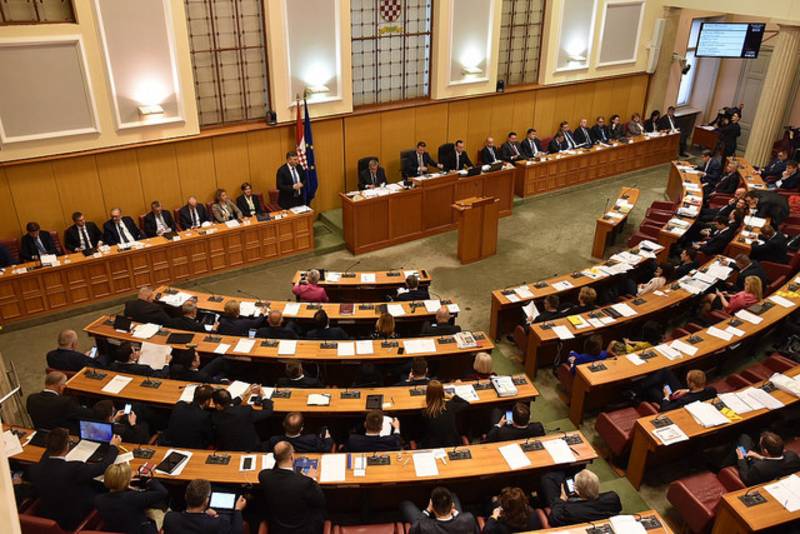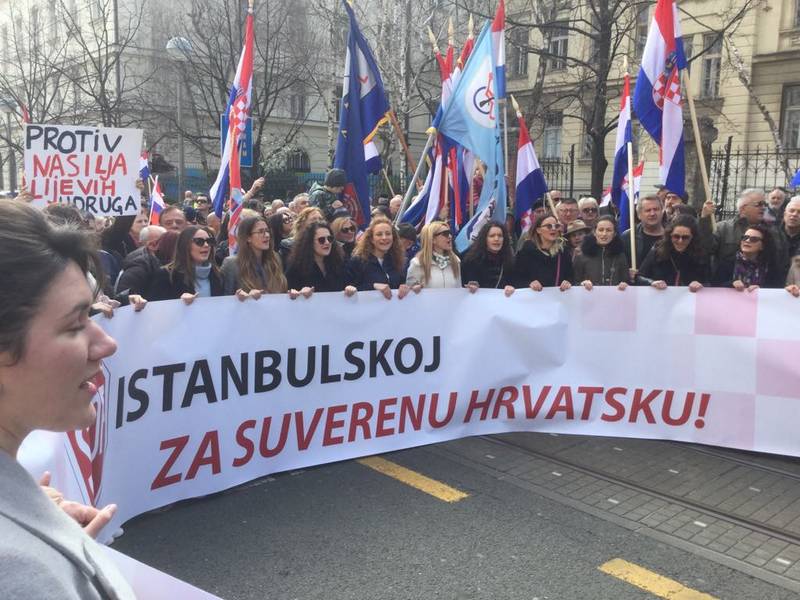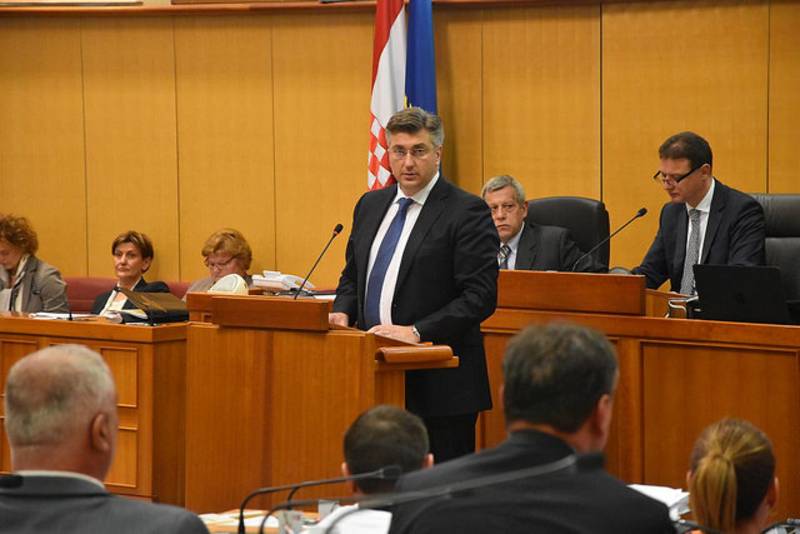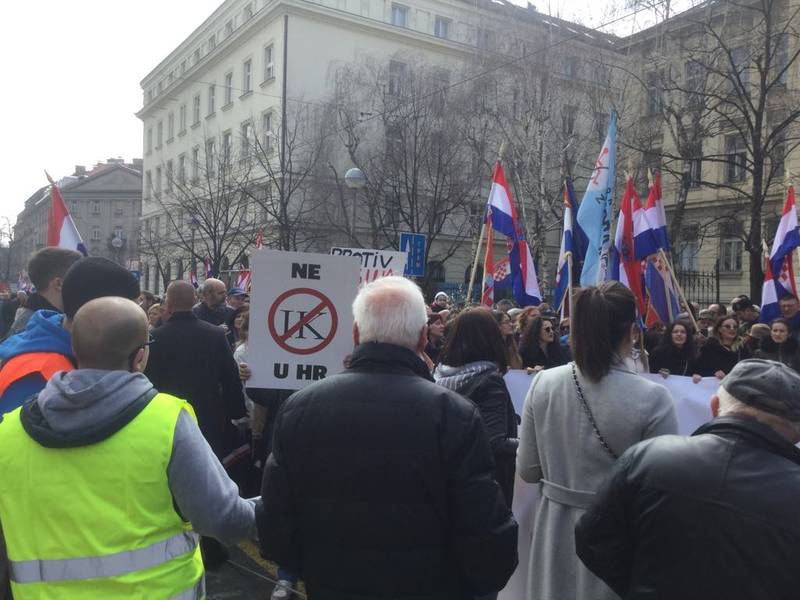Croatia Ratified the Istanbul Convention and It Was a Big Victory over Fake News
Adelina Marini, April 16, 2018
 With 110 "for", 30 "against", and two abstentions the Croatian parliament ratified last week the Istanbul Convention aimed at fighting against violence against women and domestic violence. Just a few years ago, this piece of news would have hardly made its way to the headlines because there is nothing more normal in an EU member state, which had adopted the European system of values, to be approved a document which commits to fighting a severe social phenomenon - not simply violence against women but also gender stereotyping and gender inequality. Today, however, nothing is normal. Illiberalism is flourishing, social networks have turned from a place of free expression into farms for human brains processing, a severe information war is going on. In fragile democracies, there is also a battle against those who are different, against difference of opinion, rights are been taken away.
With 110 "for", 30 "against", and two abstentions the Croatian parliament ratified last week the Istanbul Convention aimed at fighting against violence against women and domestic violence. Just a few years ago, this piece of news would have hardly made its way to the headlines because there is nothing more normal in an EU member state, which had adopted the European system of values, to be approved a document which commits to fighting a severe social phenomenon - not simply violence against women but also gender stereotyping and gender inequality. Today, however, nothing is normal. Illiberalism is flourishing, social networks have turned from a place of free expression into farms for human brains processing, a severe information war is going on. In fragile democracies, there is also a battle against those who are different, against difference of opinion, rights are been taken away.
The youngest EU member states, Croatia, is not an exception. Squeezed between the again inflamed Balkans and the sinking into illiberalism Central Europe, Croatia has been fighting for several years practically with itself. This fight started in 2015 when the Croatian Democratic Union (HDZ) came back to power. Under the leadership of Tomislav Karamarko, however, the party, which is member of the European People's Party (EPP), took the path toward the far right. Changes began at the tops of key institutions for pluralism and democracy, like the state-owned TV, the Council for Electronic Media, but also the security services. Then, it continued with flirting with Croatia's Ustasha past. The outcome did not come late - growth of nationalism and more frequent manifestations of Ustasha sentiments, which often remained without condemnation by the political elite. The proposed liberal reform of education was cancelled.
Croatia's sliding down the Hungarian-Polish slope was prevented by the then tensions between the coalition partners in the government. It led to a take-over in the HDZ. In the summer of 2016, a wind of change started to blow. At the helm of the party came the young pro-European member of the European Parliament, Andrej Plenkovic, who promised to return the HDZ to the centre-right and to put EU issues on the agenda. After the snap elections in 2016, he has become prime minister precisely with this programme, which also included ratification of the Istanbul Convention. The formation of a ruling coalition with the liberal Croatian People's Party (HNS) was conditioned on the implemention of the liberal education reform. However, the fight with the far right wing in the HDZ never started.
Neither did work on the education reform, although the issue succeeded twice to take thousands of people on the streets of major Croatian cities demanding modern, clerically-free education, based on facts and deprived of ideologies. Other highly necessary reforms for Croatia also never started, as the case with the systemically important for the economy concern Agrokor showed. It seemed as if Prime Minister Plenkovic expected everything to happen by itself. He promised the Istanbul Convention would be ratified by the end of 2017 but he did not keep his promise. Moreover, the party was shaken by a mega scandal last year when it was revealed that one of the HDZ governors was maltreating his wife. It took the party a lot of time and criticism by the opposition and Twitter-activists to decide to expel the oppressor but he kept his position as governor.
Happy Women's Day!
A day after the Bulgarian women received a slap in the face on the occasion of the 8th of March when Prime Minster Boyko Borissov announced on March 7 that the government is withdrawing the draft law on the ratification of the Istanbul Convention because of strong resistance, a leader woke up in the Croatian premier's mind. On March 8th, he announced that he is taking the matter of ratification in his own hands. This was in fact a declaration of war to the far right and the Croatian Catholic Church. The war was relentless and cruel, and the main weapon was fake news. Just like in Bulgaria, opponents of the convention spoke about the imposition of a gender ideology, they were spreading terror about an immediate change of sex of children while they are at school, spoke of a loss of sovereignty, of HDZ  having lost its Christian Democratic face, of deviation from the traditional family values, of a European diktat.
having lost its Christian Democratic face, of deviation from the traditional family values, of a European diktat.
Highly conservative organisations launched protests against the convention which turned into anti-government protests. The Croatian Catholic Church not only said it was against the ratification but individual bishops were urging openly during Sunday Church services people to take part in the protests against the convention. This is the first time in Croatia's recent history when the Church directly intervened in politics and demanded the head of a prime minister of a secular state. The unusual greetings of Premier Plenkovic for Cardinal Bozanic's name day failed to warm up relations between him and the Catholic Church. À la guerre comme à la guerre.
In all the cacophony of fake news, alternative facts and internal party rebellions, Andrej Plenkovic positioned himself as the voice of reason. With each statement he tirelessly and in cold blood, with an even voice of a lawyer, was refuting every untruth and was stressing that the essence of the convention is protection of women against violence. The culmination was his speech in the Sabor (the Croatian Parliament) on 11 April which opened the debate on the draft law of ratification. This was a speech which every woman, victim of violence, probably expected for hear. A speech that gives the thousands of women subjected to systemic violence and oppression hope, assuring them that there is a rescue.
His entire speech, which lasted around 20 minutes, was facts and refuting of fake news. He started with the black statistics, according to which, in the period between 2013-2017, out of 195 murders 91 were of women. In 70% of the cases, the murders were committed by people close to the victims, 54% were their intimate partners. In a period of two years, 38 women were killed, 33 of whom were killed by men close to them. The prime minister underscored that there is a clear trend of increase of murders and violence. He continued with more data. 552 criminal cases were opened for domestic violence. Those are cases of severe violence where 84% of the victims are beaten women.
Plenkovic addressed all the talking points of the opponents and disproved them one by one. He stressed that the document was carefully studied by specialists and lawyers who study international documents for a living, which was a clear message to those who work with alternative facts and continue to claim that the document contains something it does not. In an attempt to keep the unity of his party, Plenkovic agreed to an interpretative statement to accompany the ratification law. The statement states that the convention does not oblige Croatia to introduce gender ideology in its legal and education systems, nor does it oblige it to change the Constitutional definition of marriage.
 He also enlisted every law in which the term "gender" has been introduced long time ago. "This statistics, as well as the numbers from the beginning of my speech, are humiliating and they tell us that we are not doing enough, that the legal framework is insufficient or is not implemented as it is supposed to. The adoption of this convention is an occasion, at a declarative level, to condemn violence and to demonstrate even more strongly our will and intention to work to change this", the premier told the MPs. "By ratifying this convention we are sending a clear message to all women victims that violence is not only their problem, that it is not constrained among four walls only, but is a problem of the whole society and all of us together", the prime minister added urging all women to report violence and the institutions to respond to every signal properly.
He also enlisted every law in which the term "gender" has been introduced long time ago. "This statistics, as well as the numbers from the beginning of my speech, are humiliating and they tell us that we are not doing enough, that the legal framework is insufficient or is not implemented as it is supposed to. The adoption of this convention is an occasion, at a declarative level, to condemn violence and to demonstrate even more strongly our will and intention to work to change this", the premier told the MPs. "By ratifying this convention we are sending a clear message to all women victims that violence is not only their problem, that it is not constrained among four walls only, but is a problem of the whole society and all of us together", the prime minister added urging all women to report violence and the institutions to respond to every signal properly.
"I call on all of us to think how much courage needs a woman who has for years suffered violence, who is often economically dependent on the oppressor, traumatised, and not rarely fearing a secondary victimisation, to decide to report violence. This is just the beginning because, generally, what follows is leaving home, existential insecurity, legal procedures, often a battle for rights over children, fight against prejudices, fighting certain stereotypes. This is bravery and it requires strength. Those are tough and complex situations which are difficult to comprehend, understand and accept to those who are not in them", Andrej Plenkovic continued.
The debate was not as passionate as it was expected given the public debates before that. Reason and responsibility prevailed for this serious societal problem. The opposition supported the prime minister, although some deputies took advantage of the situation to score political points. During the debate in the public domain, the Social Democratic Party (SDP) changed its position several times. Initially, the SDP applauded the premier for his courage to face the opposition within his party, but later the party announced it would not support the ratification because of the interpretative statement. During the debate in the Sabor, the opposition decided to take the responsibility and despite being unhappy with the statement it voted in support.
A victory for Croatia but a loss for Plenkovic?
The battle over the ratification of the Istanbul Convention was not only against fake news but also against illiberalism, euroscepticism and conservatism. During his speech in the Sabor on April 11, Premier Plenkovic said he was shocked by everything he heard during the public debate. "Putting the convention on the agenda was the result of HDZ's programme and political will, in cooperation with the partners, but not under their pressure. Nor under the pressure of the opposition, the non-governmental sector, or any international institution. It is very important the Croatian public to know, to be aware, because, in Croatia, an anti-European sentiment and reflex are developing, such, I must admit, as I never imagined would happen in Croatia, in 2018. Not only on this issue, but on many issues".
He recalled that Croatia is voluntarily a member of the Council of Europe, of the EU, of NATO, and the UN. Croatia cooperates in these organisation and shares sovereignty as a state, by its own will, and not under pressure.
With this issue, Andrej Plenkovic showed that he can be a leader but the battle in his own party is yet to come. According to the results from the vote in the Sabor on April 13, 14 of his MPs voted against. Some of them are part of HDZ leadership. They gave Plenkovic confidence under the condition that he would dance under their tune. The time has come for him to face the internal opposition which is not only against the Istanbul Convention. The conservative stream is a strong opponent also of the liberal  education reform. This resistance almost took the government down recently but a compromise was found with the junior coalition partner, the HNS.
education reform. This resistance almost took the government down recently but a compromise was found with the junior coalition partner, the HNS.
Conservatives in the party are a handbrake for many reforms. Next year, the first big test for Mr Plenkovic and his leadership position in the HDZ will be the European elections. HDZ's rating has been dropping in the past months. If the trend continues, moreover given that the SDP is very weak at the moment, this will be an occasion for the right wing to again rise and eventually push its leader down. This means that Croatia will again start for the Hungarian-Polish path at a time when Plenkovic's political family, the EPP, is orbanising.
Despite his big victory with the Istanbul Convention, Andrej Plenkovic is back at the start line. This victory, however, gives him the strength to decisively face his internal opposition. It is not to be excluded that the far right might split from the HDZ, although the last parliamentary elections showed that the far right forces do not have a big potential. Opinion polls also suggest they do not have much support. If it comes to a split, it will mark the beginning of a process of fragmentation of the political space and therefore to political instability. This is the worst case scenario, where the opposition remains in the weightlessness it is currently in.
The best case scenario is Croatia to realise that it has the potential to awaken in itself a Macron-effect. The Istanbul Convention has shown how this sparkle can be kindled - through argumented, composed talk about the reforms that are crucial, through passionate fight against fake news, a clear statement of ideological belonging - for Europe, for European values, for moderate and inclusive politics, for looking forward to the future and turning a back on the past. Andrej Plenkovic used to promise some of these things two years ago when he won the election but he did nothing. What is he waiting for? The stake is not just the future of the HDZ and not even Croatia's but EU's. Plenkovic has a huge responsibility. The opposition is weak. There is no other potential leader on the horizon. If he misses this chance, Plenkovic will doom Croatia to a failure. And this is never left unpunished in the Balkans.
 Kolinda Grabar-Kitarovic | © KGK
Kolinda Grabar-Kitarovic | © KGK Jozo Rados | © European Parliament
Jozo Rados | © European Parliament Aleksandar Vucic, Andrej Plenkovic | © Vlada RH
Aleksandar Vucic, Andrej Plenkovic | © Vlada RH